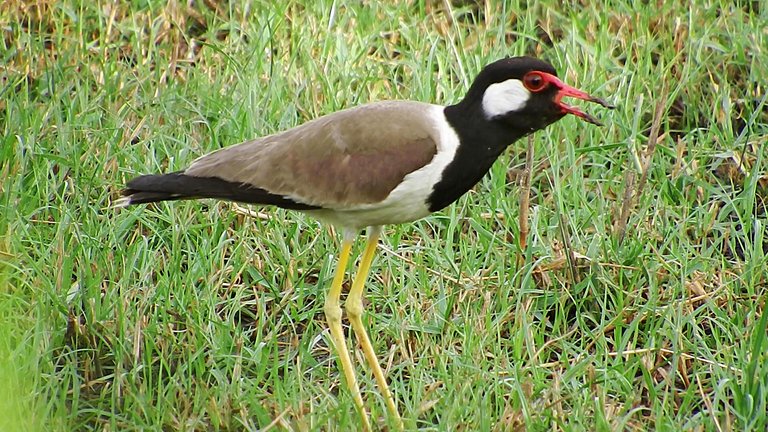
In the field of a trivial pursuit. How long would you expect an abandoned lapwing egg in a field regularly grazed by cows and patrolled by scavengers to last? I have two answers.
For the second year in a row ground-nesting red-wattled lapwings nested in the field next to us, close enough to be watched from the kitchen window. The previous year they produced two of the cutest chicks you could ever hope to see. This impressed me given that it's not a very big field and up to 16 cows often graze it.

The two lapwing parents would always stand their ground in the face of these lumbering beasts. They deflected the cows with open wings and harsh kecking calls when they were sometimes a short cow's-step away from disaster. The cows were unsure what the problem was but did always change direction enough to avoid the nest, if at times a bit grudgingly. The bull was the most reluctant and seemed indignant at being told what to do but the lapwings held firm.
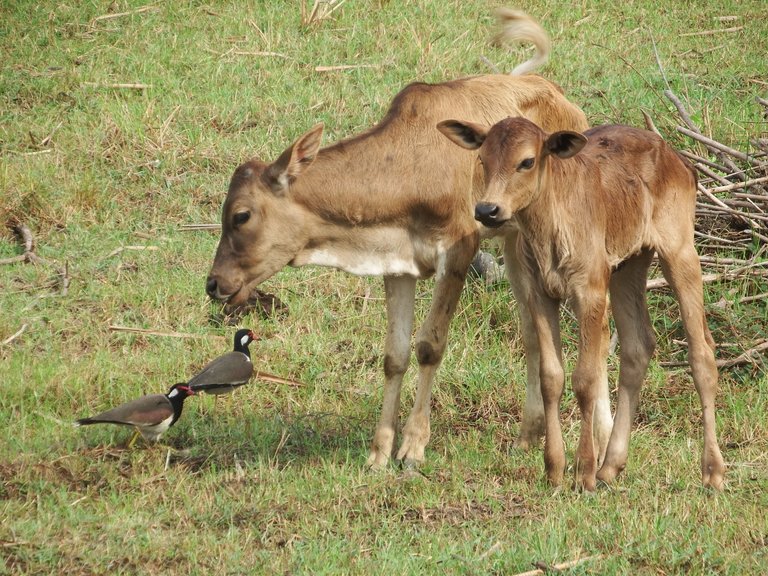
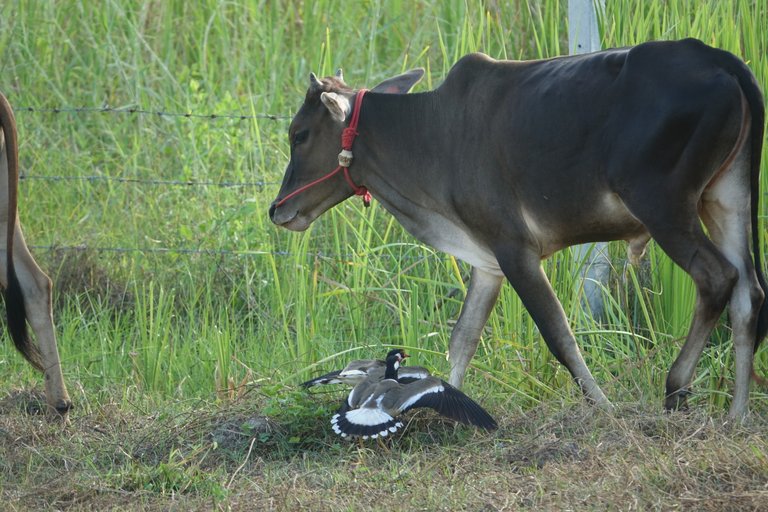
The lapwings recognised the cows as a benign threat that could destroy the nest but were not out to predate them or their eggs. They reacted differently to the more sinister threat of humans in the form of me and our seven-year-old nephew who I took for a quick look. They scolded us with serious alarm calls and flew above our heads, although I wouldn't quite call it mobbing. Then they moved further away and presumably hoped that egg-camouflage would do its work. It did not as I had mentally marked the position to avoid stepping on the nest and found them easily. But it turned out we were as benign as cows and the eggs survived our brief visit.
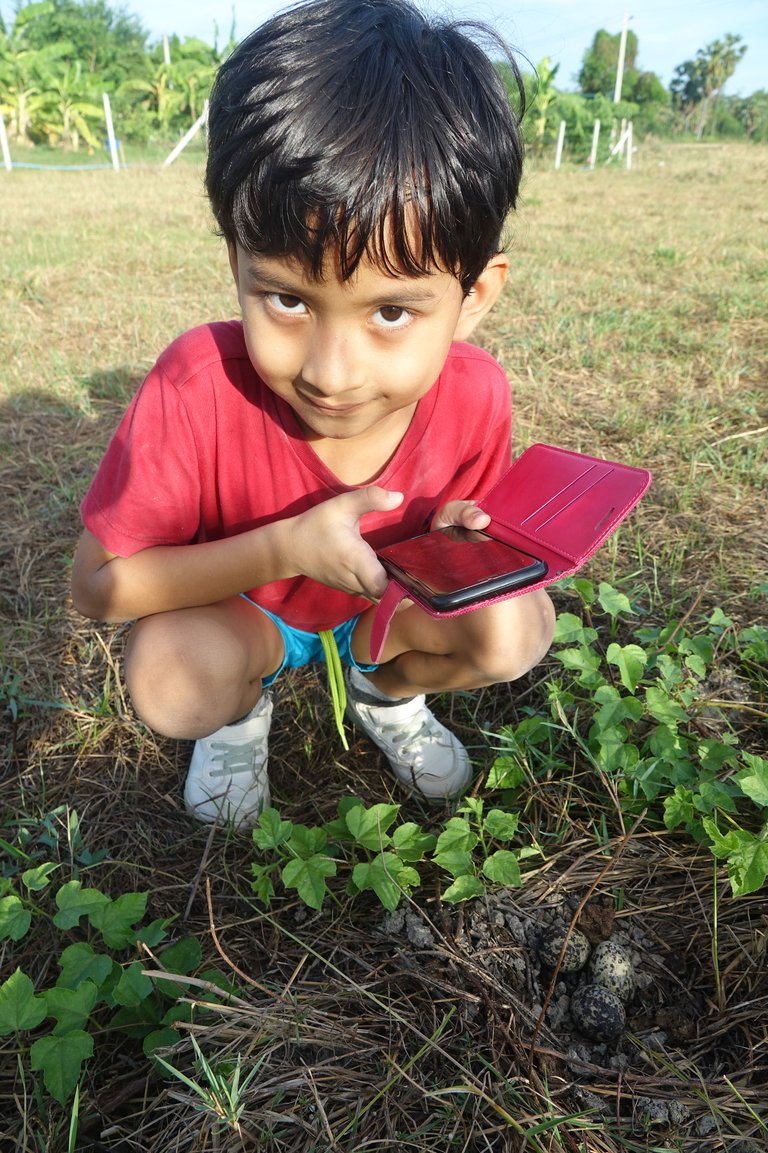
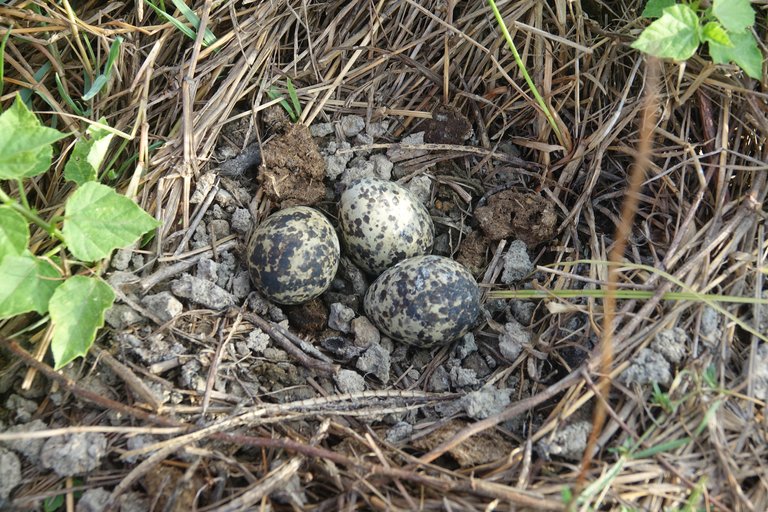
For the early part of the nesting season there are also harriers scouting over the field every day plus the continuous threat from flights of crows, skulking coucals, monitor lizards and occasional snakes. But at least two eggs did hatch that year and my only disappointment was that within a day they had already wandered away from that field so I lost touch with them.
Those chicks were so endearing that I was looking forward to a chance to see some more the next year. However, things did not work out quite so well for them this time. A few days after I first saw the female sitting on eggs, water from the adjacent irrigation canal leaked into the field and semi-flooded it. So this field became a mix of large puddles and patches of drier but still soggy ground.
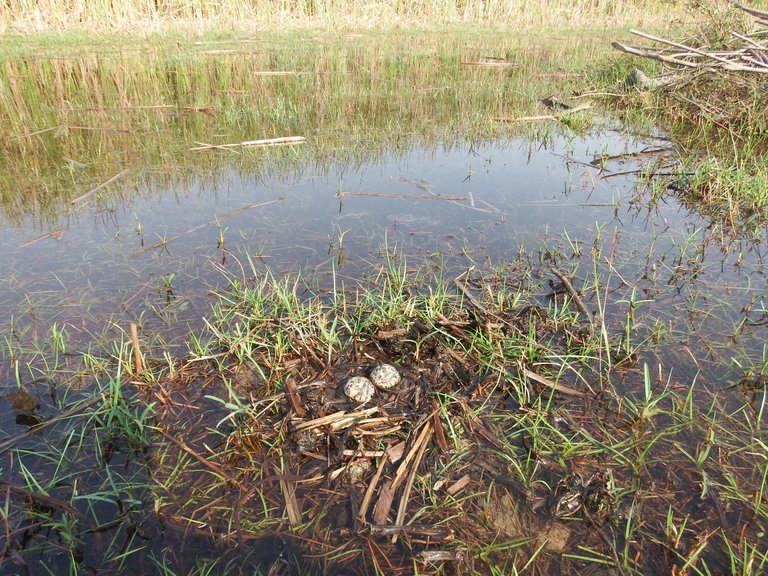
The lapwing nest was very slightly raised and looked as though it might actually have escaped the worst of the wet. But I was just being fooled by the matted grass sticky up through the water making it look like solid ground. For a day the lapwing tried to brood her eggs but was uncomfortable with the soaking her underparts were getting.
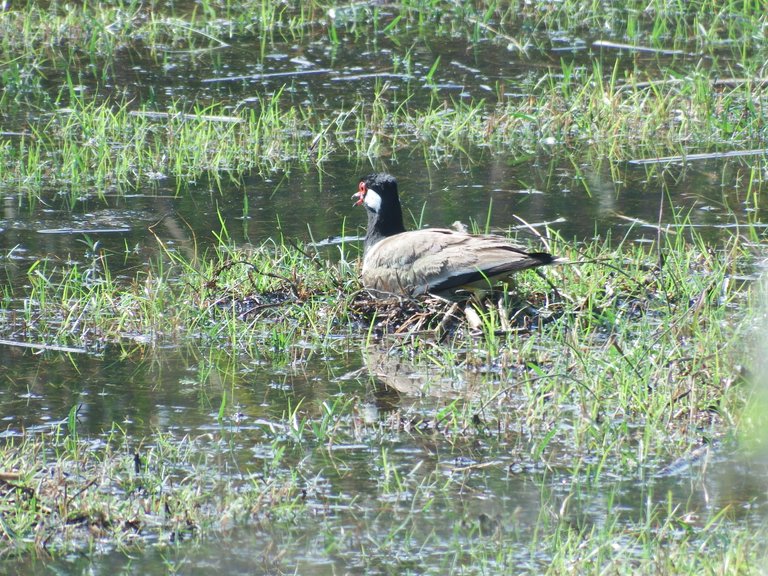
The next day when the water hadn't receded she gave up and drifted further away. I sloshed over for a look at the nest and found the water was actually half way up the two eggs. Any higher and they might have floated away.
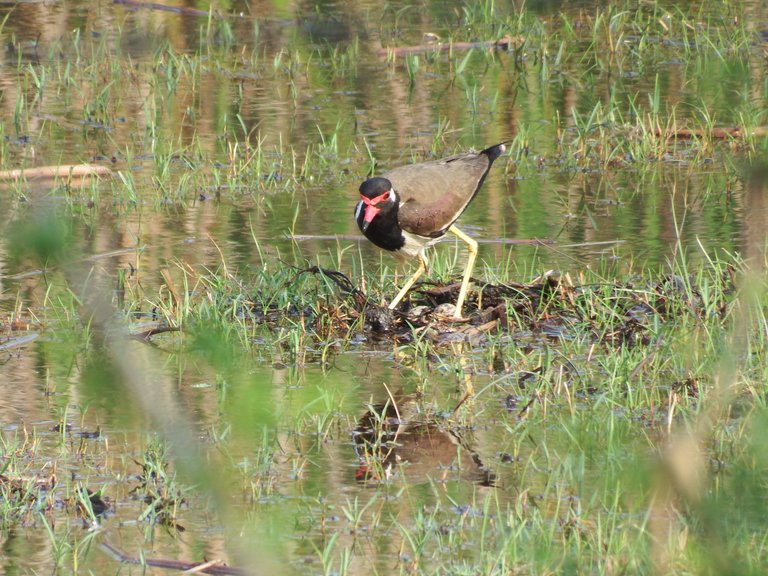
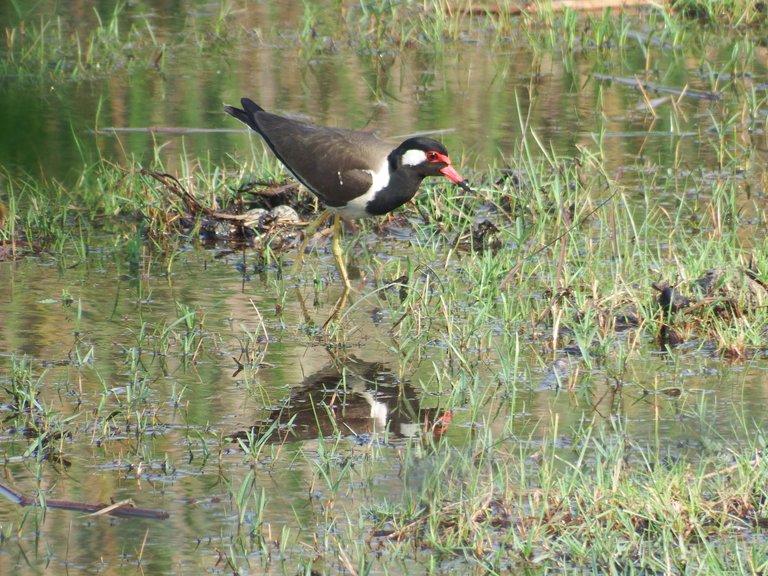
Without the protection of the parents I didn't think the eggs would last long as I'm not that impressed with the camouflaging of the nest. The eggs are nicely mottled and would be hard to spot if randomly placed in a field but they sit in a simple raised depression of a nest. There is a slight ring of dried grass around it that almost acts as an asterisk marking where the eggs are. They are not exactly obvious but I am also starting to feel unimpressed with our local scavengers.
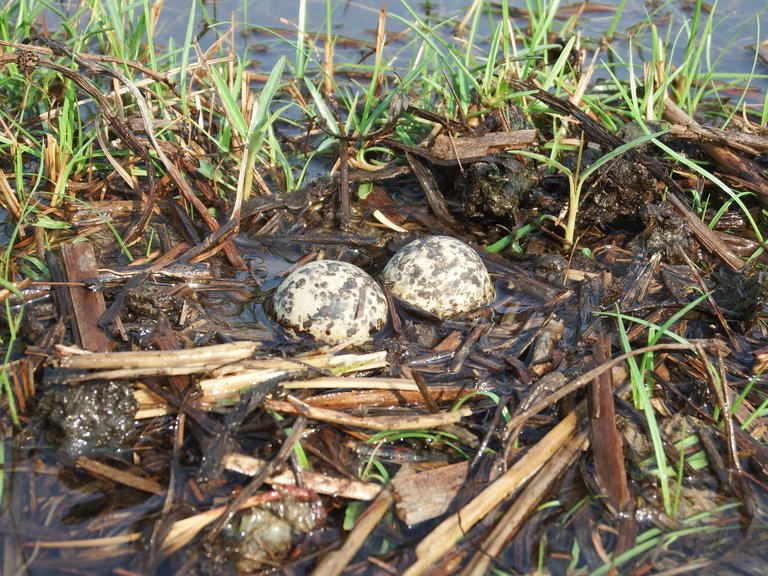
Well, they lasted four days before the water receded enough for the cows to be let back in. As far as I could see it took half an hour for a cow to hit the nest. However, the hoof only smashed one egg, which was scavenged by ants and the myna birds who were following the cows at the time. The other egg was ignored and survived the day. It was then saved by the water level rising again so the farmer left his cows elsewhere for a few more days. A week later and the cows had hardly spent any time in the field. Thanks to the accidental irrigation the grass had grown enough to conceal the remaining egg a little better.
Climbing through the barbed wire fence to check this egg became a daily ritual for me and my shorts suffered from getting snagged. I'm not quite sure why it became so important to me. The egg seemed intact but was no longer viable and would never produce anything other than a bad smell. Having seen so many nests failing due to predation it surprised me how long this lone egg had lasted. Maybe the parents' activity around the nest is a key give-away to predators. There could also be something about an old egg that fails to trigger an "eat me" response.
Three weeks after the egg was abandoned it was still there even with the cows grazing most days. They would presumably step on it eventually, but I suspected it would last longer than my shorts. The cows had also lowered the height of the grass sward making the egg more visible again.
It was almost a relief one morning when I found the egg smashed and the remains covered by ants. I assume a cow had finally hit it the day before. This was 28 days after the original abandonment. A meaningless statistic but one that I enjoyed making the effort to collect.
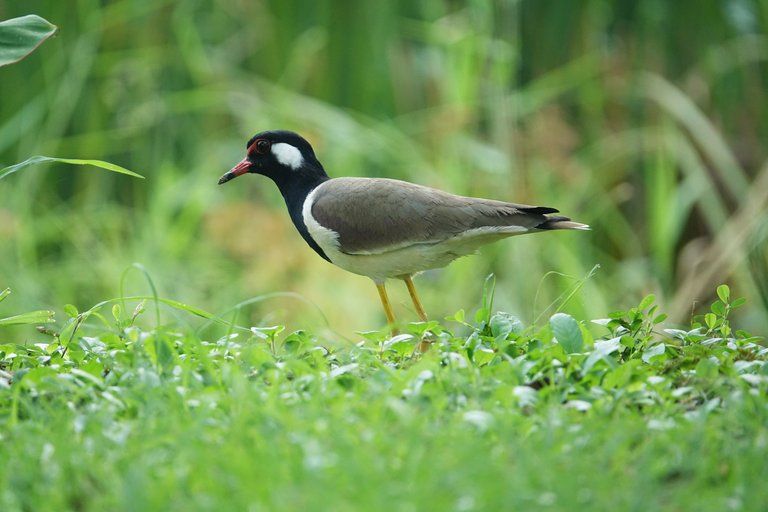
And now the lapwings, sometimes four of them, spend most of their time in our garden enjoying the mix of grass and shade.
Moral of the story? The role of chance in fate, I guess. Two eggs touching each other in the same abandoned nest. One destroyed by a hoof as soon as the cows arrived, the other survived almost a month. In the end their final fate was the same, it is just a question of how long it takes for the cows to tred on you.
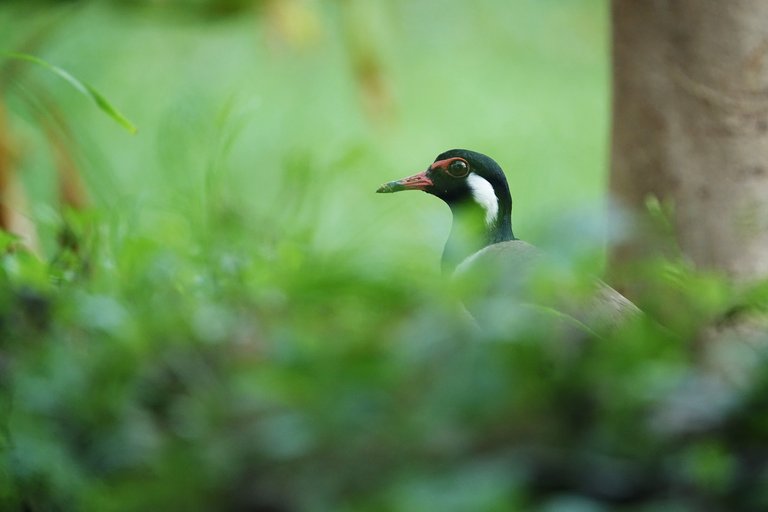
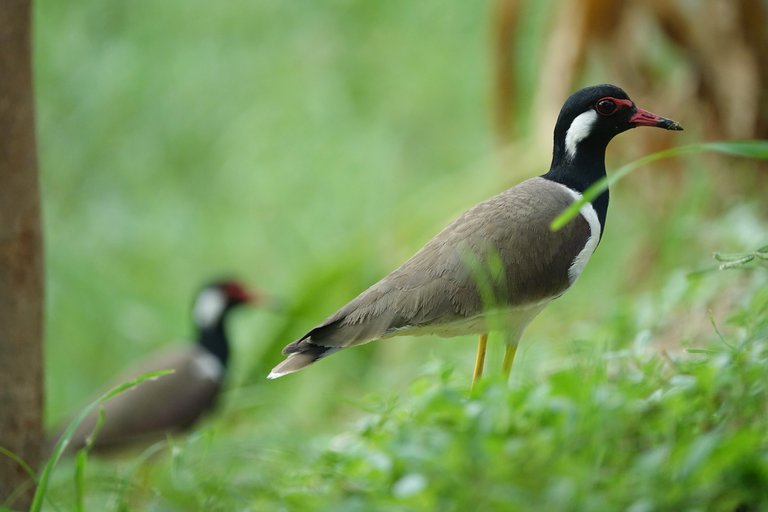


so very interesting post ! promoted on Ecency for 2 days 🏅 🤞
Thank you, much appreciated!
@tipu curate
Upvoted 👌 (Mana: 29/49) Liquid rewards.
Superb reading and beautiful photos. The wildlife is truly stunning.
Thank you so much! I am lucky to live here 😁
With our lapwings they will bomb dive very close driving you off.
Tenacious birds sadly the fate in your case was flooding and cattle, down here we have the monkeys raid the nests, snakes, monitor lizards so birds do have a rough time raising their young.
Nice you found the eggs and kept a watchful eye on what was going on.
!BEER
Thank you so much as always!
Nature proves there are always unusual circumstances we all need to work around.
!PIZZA
Yes, expect the unexpected!
View or trade
BEER.Hey @hadrianwild, here is a little bit of
BEERfrom @joanstewart for you. Enjoy it!Learn how to earn FREE BEER each day by staking your
BEER.$PIZZA slices delivered:
@joanstewart(2/10) tipped @hadrianwild
De verdad me encantan las fotos que le tomaste a esas aves tan hermosas y de verdad admito tu interés en esas aves tan hermosas, también me alegra que nunca le paso nada al nido.
Thank you very much!
Yay! 🤗
Your content has been boosted with Ecency Points, by @hadrianwild.
Use Ecency daily to boost your growth on platform!
Support Ecency
Vote for new Proposal
Delegate HP and earn more
Such an interesting story you have. It surprised me how some birds use for nests places as such - seems unprotected, but yet the eggs do blend with the environment. Still it is a matter of chance whether they will survive or not.

Thank you very much for your wonderful post.
My pleasure. It’s always interesting to try to work out what’s going on.